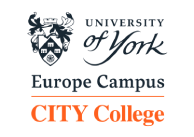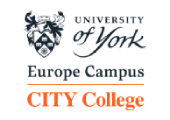Finance and Banking - MSc


Degree Title: Master of Science in Finance and Banking
Dual degree: Upon successful completion of the programme graduates are awarded the MSc in Finance and Banking degree directly from the University of York. Graduates also receive an undergraduate degree from the New Bulgarian University (NBU) by fulfilling the NBU requirements.
Course duration: 2 years (classes 2 weekends per month; one weekend is taught by CITY College, University of York Europe Campus and the other by NBU)
Admission requirements: Applicants should apply independently to both CITY College, University of York Europe Campus and NBU by filling in their respective application forms. To be officially admitted to the programme, applicants should comply with both institutions' entry requirements and should be accepted as students by both.
For more information about the joint University of York and NBU degree, graduates may contact our Country Office in Sofia (23 Tvardishki prohod street, Fl. 9, office 34 , Tel: +359 2 961 62 63, +359 888/ 43 57 50) or fill in the online form below or contact NBU directly.
Why choose this course?
-
Degree from one of the world’s top universities, the University of York.
-
Dual degree: Graduates will also receive a degree from New Bulgarian University (NBU).
-
Use of on-line trading simulators helping students to put theory into practice.
-
Students are exposed to different types of financial assets, markets and institutions and appreciate various schools of analysis.
-
Expert teaching team, comprised of seasoned academics and industry experts with experience in banking and finance.
-
Graduates may pursue careers in corporate finance, financial planning, investment banking, investment consulting, private banking and many more.
-
Specialised programme of studies focusing on latest theory and practical applications of the finance industry.
- A pathway to a successful career in Europe and abroad.
The programme is designed for students who intend to pursue a career in the financial services sector. In recent years, the financial services industry has seen rapid worldwide development and change. Within this environment, there is an increasing demand for financial specialists capable of understanding the rules and complexities of the modern financial system.The MSc in Finance & Banking enables students to develop both theoretical and applied perspectives as well as a range of specialist skills. It will develop practical skills in banking and finance as well as analytical skills in relation to financial institutions and markets, portfolio management, instruments, and other critical areas.
Entry requirements
View the application and admission requirements of the programme.
How to apply
If you wish to apply for this programme you may view details of the application process.
Any questions?
If you'd like to know more about this programme, contact our Admissions Team at dpencheva
- Econometrics for Finance
- Investments and Security Analysis
- Corporate Finance and Valuations
- Financial Reporting and Analysis
- Bank Regulation and Financial Stability
- Commercial and Investment Banking
- Financial Derivatives and Risk Management
- Research Methods for Finance
- Dissertation /Research Project
Econometrics for Finance
This unit is highly technical in nature, as it predominantly attempts to expose the quantitative aspects that people in the business and finance profession must be acquainted with should they want to perform everyday tasks effectively. Topics such as decision analysis, inferential statistics, regression and correlation analysis, model specification, econometric problems, time series, and forecasting, provide the platform on which an insightful and vigorous analysis will be conducted. ![]()
Investments and Security Analysis
This unit aims to help students acquire a thorough understanding of the areas of portfolio management and security valuation and analysis. It will provide them with the investment background and recent developments in investment theory, capital markets and asset pricing. Furthermore, it will familiarise them with modern quantitative methods of security and portfolio valuation. Security analysis will focus on fixed income and equity. Important empirical and theoretical evidence will be examined along with practical implementation of tools and methodologies. ![]()
Corporate Finance and Valuations
The unit focuses on the principles of corporate finance such as investing in projects that yield a return greater than the minimum acceptable hurdle rate, choosing a financing mix that minimizes the hurdle rate and matches the assets being financed. Furthermore, it deals with CAPM, capital structure and dividend policy decisions. It also takes a practical approach to valuations of entities. ![]()
Financial Reporting and Analysis
Companies’ financial statements and annual reports are critical instruments in presenting a corporation's financial position, the result of its operations and its cash flows to external and internal users. The main objective of this unit is to give students a critical understanding of financial information; how this information is prepared and; how it can be analysed so as to draw useful conclusions for decision making purposes. The unit examines some of the major aspects of the financial reporting process, its analysis and interpretation. It thereby encourages a critical rather than automatic acceptance of the underlying assumptions behind accounting linking theory with practical examples. ![]()
Bank Regulation and Financial Stability
Financial stability has become an explicit objective of central banks around the world in the past ten years, following the financial crisis. The unit will start with an overview of the functions and regulation of banks, exchanges, over-the-counter markets, broker-dealers, institutional investors, and mutual and hedge funds. Following that the unit will provide an advanced analysis of how bank regulations affect bank risk management practices. This is put in perspective with recent market developments and innovations. Examples and cases will be drawn from the international financial system while the idiosyncratic character of the Greek financial system will be stressed. ![]()
Commercial and Investment Banking
This unit attempts to provide a broad overview of commercial and investment banking, their role in the economy and the forces that are continuing to change them worldwide. The unit examines in detail issues such as consumer and commercial credit analysis, asset and liability management, risk management, foreign exchange rates, loan policy and money management services. Furthermore, topics covered include investment banking activities, such as raising capital, advising on mergers and acquisitions, brokerage/dealership activities, asset management and proprietary trading and investing. ![]()
Financial Derivatives and Risk Management
This unit is based on the analytics of financial derivatives and risk management. Specifically, the unit examines the pricing and use of financial derivatives, including options, forwards, and futures, and swaps, as well as hedging and Value-at-risk in risk management. The course focuses extensively on the analytical aspects of derivative products and the practical applications of risk management tools in various contexts. ![]()
Research Methods for Finance
In the first semester this unit provides essential information on academic presentation, referencing, research and writing skills, different approaches to research and proposal preparation. In the second semester the unit provides students with a sound understanding and the skills needed to apply the methodologies used in quantitative time series analysis.
This is done by familiarising them with the tools that are used in contemporary financial econometrics. At the end of the unit, students are able to critically evaluate the existing literature on the field and to conduct modern research design and execution. The ultimate goal of the unit is to enable students to produce a well thought out dissertation proposal and research project. ![]()
The Business Administration & Economics Department (BAED) of CITY College, University of York Europe Campus aims at providing all students with an intellectually stimulating and supportive environment that allows them to acquire important skills and competencies for their professional and personal life.
Business matters at BAED. Our undergraduate and postgraduate courses in management related disciplines are designed to challenge students’ thinking and inspire them to develop the advanced knowledge and analytical skills they will need to succeed in business.
Our academics continually work with international, national and regional businesses as part of their research and use their experiences to make their teaching relevant and up-to-date.
More about the Business Administration & Economics Department
Research at the Business Administration & Economics Department
Contact the Business Administration & Economics Department
Graduates of the MSc in Finance and Banking programme may pursue careers in corporate finance, financial planning, investment banking, money management, private banking, retail banking, business consulting, investment consulting and more.
Career, Employability and Enterprise Centre
The Career, Employability and Enterprise Centre, focuses on helping students to set attainable career goals. It offers advice on CVs and cover letters, and on how to effectively handle job interviews. Through career fairs, and different internship programmes, the department aims at constantly bringing students in contact with prospective employers.
More about our Career Services.
Contact the Career, Employability and Enterprise Centre at careers@york.citycollege.eu








